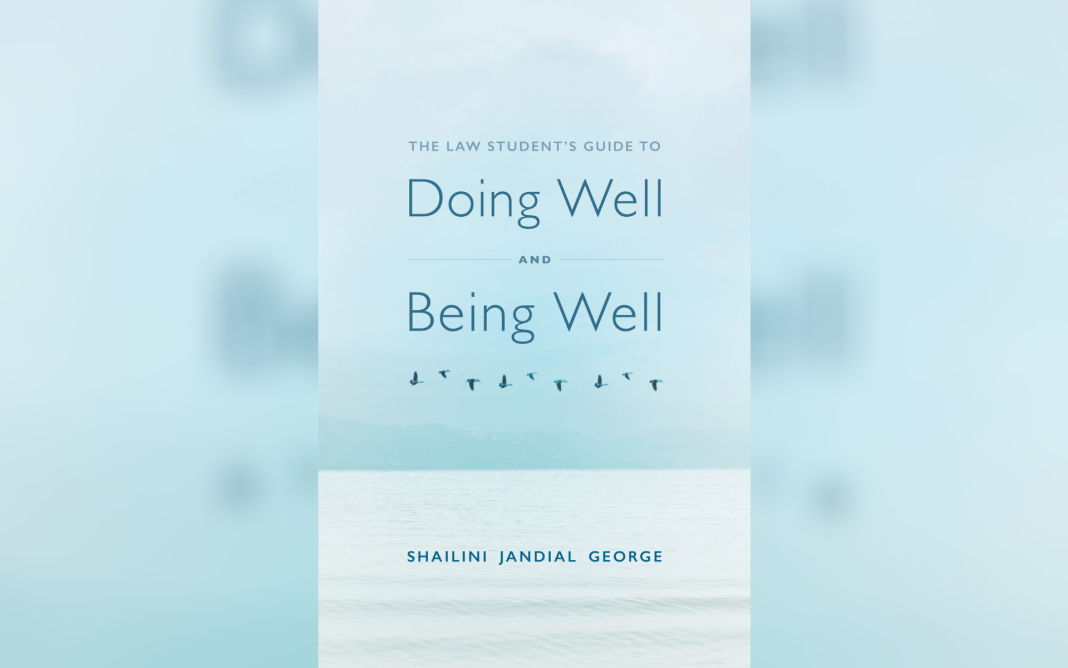Editor’s note: The following is an excerpt from The Law Student’s Guide to Doing Well and Being Well written by Shailini George and published by Carolina Academic Press.
I won’t sugar coat it. By now you know, either personally or anecdotally, that law school causes stress. In fact, 96% of law students experience significant levels of stress, compared to 70% of medical students and 43% of graduate students.
Depression, anxiety, and alcohol or drug-related abuse occurs at much higher rates among law students and lawyers than in the general population. At first, you might wonder if this is because people who are prone to stress and its effects are drawn to a career in law. That’s not really the case, though. Researchers believe that law students’ mental health is similar to that of other graduate students upon entering school, but law-school induced stress seems to lead them to higher rates of depression and overall demoralization.
What is so different about law school? You knew it would be hard. But law school may feel more competitive and adversarial than you imagined. Although you were probably quite successful in school previously, law school is likely different and harder, and it requires new techniques to study and learn. Mandatory grading curves can be unforgiving and demoralizing. If you are in a new city and new environment, you may not have the same support available to you to handle stress as well.
Further, as discussed in Chapter One, law school can make you feel like an imposter, or believe that other students are handling things more easily. Despite external evidence of their competence, those exhibiting imposter syndrome remain convinced that they are frauds and do not deserve the success they have achieved. Proof of success is dismissed as luck, timing, or a result of deceiving others into thinking they are more intelligent and competent than they believe themselves to be. Some studies suggest that impostor syndrome is particularly common among high-achieving women and minorities.
All of these factors lead to high levels of law student stress. Maybe you think law school is temporary and you can stick it out. That’s not a great plan because you will be facing even more stress as a lawyer.
I suspect it will not come as a surprise to you that too much stress is bad for you. The very many ways it is counterproductive may surprise you, however. We are all familiar with the concept that stress causes mental anxiety. In fact, stress also interferes with your brain’s ability to concentrate and to learn. Stress is directly detrimental to brain health. Excess stress can wreak havoc on your body as well. From headaches and chest pain to muscle tension and upset stomachs, stress can affect your entire body. And, as anyone who has dealt with severe stress knows, sleep can become difficult, anxiety can build up, and irritability can surge.
We should recognize, however, that not all stress is bad. The good side of stress helps motivate you to prepare for a task (like a book-manuscript deadline, for example). The body’s response to stress developed to handle life-threatening circumstances, for example, encountering a saber-toothed tiger in the hunter-gatherer era. In that type of situation, the sympathetic nervous system kicks into gear. The body ramps up its reactions and devotes all its energy to facing or avoiding the danger or enemy. You probably remember a time your heart raced when you were faced with stress. That happens as part of the body’s stress response: your heart rate increases so that more oxygen can be pumped to your muscles, and blood is diverted there as well. The stress hormones adrenaline, epinephrine, norepinephrine, and cortisol are released. All these physiological changes are known as the “fight or flight” response and they allow a person to survive in the face of an extreme threat.
While there are, therefore, positive effects of stress, chronic or habitual stress can be harmful on multiple levels, both physically and mentally. In our modern era, the stresses we face are not lions and tigers and bears (oh my!), but homework, deadlines, and clients, etc. The body doesn’t recognize the different sources of stress, but it produces the same responses. Some of these responses are particularly important for us to understand, like the effects of cortisol on learning.
Cortisol is released for hours after a stressful event, and that excess cortisol can impair cognitive performance. It damages the brain and blocks the formation of new connections in the hippocampus, which is critical to the learning process as it helps information transform from working memory into long-term memory. The hippocampus is located near the brain’s emotional center, the amygdala. Stress fires up the amygdala, which releases cortisol, which in turn interferes with hippocampus function. The more cortisol released by the amygdala, the less you are able to focus by using the prefrontal cortex. So, in short, stress can prevent you from learning.
Stress negatively impacts us not just by impairing cognitive performance, but it also dampens thyroid function, decreases bone density, disrupts sleep, reduces muscle mass, elevates blood pressure, lowers immune function, slows wound healing, and can also lead to heart attacks, strokes, higher levels of LDL (bad cholesterol) and lower levels of HDL (good cholesterol), depression, and more.
Scientists believe that psychological stress can induce disease by creating behaviors such as poor sleep, less exercise, poor eating choices, smoking, excess drinking, and by releasing hormones which negatively affect many organs and the immune system. If I told you that there was something you could do to improve your attention, perception, short-term memory, and learning, I’m pretty sure you would say, “sign me up.” You can impact the negative loop of behaviors that severely impact cognitive functioning, by working to reduce the impact of stress.
You can read the rest of “Chapter Three: Stress” in The Law Student’s Guide to Doing Well and Being Well by Shailini George.

Professor Shailini George teaches legal writing at Suffolk University Law School in Boston, Massachusetts and her scholarship focus on the areas of lawyer well-being, mindfulness, and the cognitive science of learning. She is the author of the recently released The Law Student’s Guide to Doing Well and Being Well, as well as law review articles on distraction and the cognitive science of learning and why law students need mindfulness training. Professor George can be reached at sjgeorge@suffolk.edu.

